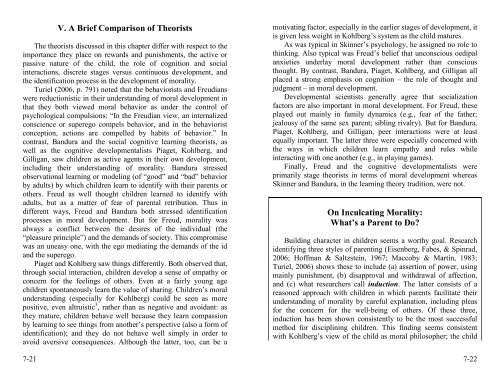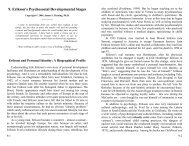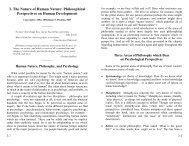7. Piaget, Kohlberg, Gilligan, and Others on Moral Development
7. Piaget, Kohlberg, Gilligan, and Others on Moral Development
7. Piaget, Kohlberg, Gilligan, and Others on Moral Development
You also want an ePaper? Increase the reach of your titles
YUMPU automatically turns print PDFs into web optimized ePapers that Google loves.
7-21<br />
V. A Brief Comparis<strong>on</strong> of Theorists<br />
The theorists discussed in this chapter differ with respect to the<br />
importance they place <strong>on</strong> rewards <str<strong>on</strong>g>and</str<strong>on</strong>g> punishments, the active or<br />
passive nature of the child, the role of cogniti<strong>on</strong> <str<strong>on</strong>g>and</str<strong>on</strong>g> social<br />
interacti<strong>on</strong>s, discrete stages versus c<strong>on</strong>tinuous development, <str<strong>on</strong>g>and</str<strong>on</strong>g><br />
the identificati<strong>on</strong> process in the development of morality.<br />
Turiel (2006, p. 791) noted that the behaviorists <str<strong>on</strong>g>and</str<strong>on</strong>g> Freudians<br />
were reducti<strong>on</strong>istic in their underst<str<strong>on</strong>g>and</str<strong>on</strong>g>ing of moral development in<br />
that they both viewed moral behavior as under the c<strong>on</strong>trol of<br />
psychological compulsi<strong>on</strong>s: “In the Freudian view, an internalized<br />
c<strong>on</strong>science or superego compels behavior, <str<strong>on</strong>g>and</str<strong>on</strong>g> in the behaviorist<br />
c<strong>on</strong>cepti<strong>on</strong>, acti<strong>on</strong>s are compelled by habits of behavior.” In<br />
c<strong>on</strong>trast, B<str<strong>on</strong>g>and</str<strong>on</strong>g>ura <str<strong>on</strong>g>and</str<strong>on</strong>g> the social cognitive learning theorists, as<br />
well as the cognitive developmentalists <str<strong>on</strong>g>Piaget</str<strong>on</strong>g>, <str<strong>on</strong>g>Kohlberg</str<strong>on</strong>g>, <str<strong>on</strong>g>and</str<strong>on</strong>g><br />
<str<strong>on</strong>g>Gilligan</str<strong>on</strong>g>, saw children as active agents in their own development,<br />
including their underst<str<strong>on</strong>g>and</str<strong>on</strong>g>ing of morality. B<str<strong>on</strong>g>and</str<strong>on</strong>g>ura stressed<br />
observati<strong>on</strong>al learning or modeling (of “good” <str<strong>on</strong>g>and</str<strong>on</strong>g> “bad” behavior<br />
by adults) by which children learn to identify with their parents or<br />
others. Freud as well thought children learned to identify with<br />
adults, but as a matter of fear of parental retributi<strong>on</strong>. Thus in<br />
different ways, Freud <str<strong>on</strong>g>and</str<strong>on</strong>g> B<str<strong>on</strong>g>and</str<strong>on</strong>g>ura both stressed identificati<strong>on</strong><br />
processes in moral development. But for Freud, morality was<br />
always a c<strong>on</strong>flict between the desires of the individual (the<br />
“pleasure principle”) <str<strong>on</strong>g>and</str<strong>on</strong>g> the dem<str<strong>on</strong>g>and</str<strong>on</strong>g>s of society. This compromise<br />
was an uneasy <strong>on</strong>e, with the ego mediating the dem<str<strong>on</strong>g>and</str<strong>on</strong>g>s of the id<br />
<str<strong>on</strong>g>and</str<strong>on</strong>g> the superego.<br />
<str<strong>on</strong>g>Piaget</str<strong>on</strong>g> <str<strong>on</strong>g>and</str<strong>on</strong>g> <str<strong>on</strong>g>Kohlberg</str<strong>on</strong>g> saw things differently. Both observed that,<br />
through social interacti<strong>on</strong>, children develop a sense of empathy or<br />
c<strong>on</strong>cern for the feelings of others. Even at a fairly young age<br />
children sp<strong>on</strong>taneously learn the value of sharing. Children’s moral<br />
underst<str<strong>on</strong>g>and</str<strong>on</strong>g>ing (especially for <str<strong>on</strong>g>Kohlberg</str<strong>on</strong>g>) could be seen as more<br />
positive, even altruistic 3 , rather than as negative <str<strong>on</strong>g>and</str<strong>on</strong>g> avoidant: as<br />
they mature, children behave well because they learn compassi<strong>on</strong><br />
by learning to see things from another’s perspective (also a form of<br />
identificati<strong>on</strong>); <str<strong>on</strong>g>and</str<strong>on</strong>g> they do not behave well simply in order to<br />
avoid aversive c<strong>on</strong>sequences. Although the latter, too, can be a<br />
motivating factor, especially in the earlier stages of development, it<br />
is given less weight in <str<strong>on</strong>g>Kohlberg</str<strong>on</strong>g>’s system as the child matures.<br />
As was typical in Skinner’s psychology, he assigned no role to<br />
thinking. Also typical was Freud’s belief that unc<strong>on</strong>scious oedipal<br />
anxieties underlay moral development rather than c<strong>on</strong>scious<br />
thought. By c<strong>on</strong>trast, B<str<strong>on</strong>g>and</str<strong>on</strong>g>ura, <str<strong>on</strong>g>Piaget</str<strong>on</strong>g>, <str<strong>on</strong>g>Kohlberg</str<strong>on</strong>g>, <str<strong>on</strong>g>and</str<strong>on</strong>g> <str<strong>on</strong>g>Gilligan</str<strong>on</strong>g> all<br />
placed a str<strong>on</strong>g emphasis <strong>on</strong> cogniti<strong>on</strong> – the role of thought <str<strong>on</strong>g>and</str<strong>on</strong>g><br />
judgment – in moral development.<br />
<strong>Development</strong>al scientists generally agree that socializati<strong>on</strong><br />
factors are also important in moral development. For Freud, these<br />
played out mainly in family dynamics (e.g., fear of the father;<br />
jealousy of the same sex parent; sibling rivalry). But for B<str<strong>on</strong>g>and</str<strong>on</strong>g>ura,<br />
<str<strong>on</strong>g>Piaget</str<strong>on</strong>g>, <str<strong>on</strong>g>Kohlberg</str<strong>on</strong>g>, <str<strong>on</strong>g>and</str<strong>on</strong>g> <str<strong>on</strong>g>Gilligan</str<strong>on</strong>g>, peer interacti<strong>on</strong>s were at least<br />
equally important. The latter three were especially c<strong>on</strong>cerned with<br />
the ways in which children learn empathy <str<strong>on</strong>g>and</str<strong>on</strong>g> rules while<br />
interacting with <strong>on</strong>e another (e.g., in playing games).<br />
Finally, Freud <str<strong>on</strong>g>and</str<strong>on</strong>g> the cognitive developmentalists were<br />
primarily stage theorists in terms of moral development whereas<br />
Skinner <str<strong>on</strong>g>and</str<strong>on</strong>g> B<str<strong>on</strong>g>and</str<strong>on</strong>g>ura, in the learning theory traditi<strong>on</strong>, were not.<br />
On Inculcating <strong>Moral</strong>ity:<br />
What’s a Parent to Do?<br />
Building character in children seems a worthy goal. Research<br />
identifying three styles of parenting (Eisenberg, Fabes, & Spinrad,<br />
2006; Hoffman & Saltzstein, 1967; Maccoby & Martin, 1983;<br />
Turiel, 2006) shows these to include (a) asserti<strong>on</strong> of power, using<br />
mainly punishment, (b) disapproval <str<strong>on</strong>g>and</str<strong>on</strong>g> withdrawal of affecti<strong>on</strong>,<br />
<str<strong>on</strong>g>and</str<strong>on</strong>g> (c) what researchers call inducti<strong>on</strong>. The latter c<strong>on</strong>sists of a<br />
reas<strong>on</strong>ed approach with children in which parents facilitate their<br />
underst<str<strong>on</strong>g>and</str<strong>on</strong>g>ing of morality by careful explanati<strong>on</strong>, including pleas<br />
for the c<strong>on</strong>cern for the well-being of others. Of these three,<br />
inducti<strong>on</strong> has been shown c<strong>on</strong>sistently to be the most successful<br />
method for disciplining children. This finding seems c<strong>on</strong>sistent<br />
with <str<strong>on</strong>g>Kohlberg</str<strong>on</strong>g>’s view of the child as moral philosopher; the child<br />
7-22




